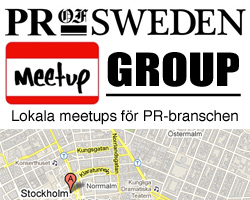We all need to be persuasive from time to time. Such is the nature of things. Classic PR thinking is useful also when it comes to being persuasive on the social web. How?
1. Casually Claim Your Authority
Do you have some sort of influence? Have you published a book? Do you have a degree in something? Are people subscribing to you? Do you have a bunch of followers? Do you work with something interesting? Do you have some sort of testimonials to show off? Have you been been published lately? Are people linking you up? Have you won any awards?
Show off your authority, but don’t strain yourself doing it. Here’s the time to be casual. Just state what you have going for you and then be done with it.
2. Confidence: Play to Your Strengths
Are you somewhat good-looking? If you are, people will like you better and also care more about what you have to say. Maybe you have a stylish sense for sleek web design or maybe you are a great photographer. A beautiful mind, perhaps? Then simply let your words do the talking! In whatever form, beauty is a strong persuasion factor.
Note: Please don’t mistake ‘beauty’ for ‘high production cost’. Authenticity and ingenuity trumps a vulgar budget any time, any day.
3. Behold the Beholder
People follow suit because they are tribal collectors, adding small gems as attributes to their lives as they go along. Therefore, you need to cater to your specific community and their needs. Since beauty is in the eye of the beholder, you must look good to your specific community. And every community appreciates different traits in their thought leaders.
How do you know what your community responds to? Simply by leveraging the most powerful of all persuasion techniques—listening.
4. The Borrowed Genius Technique
Your website will be more persuasive if it can leverage the trust of already authoritative figures. By simply associating them with yourself, their capital of trust will rub off on your digital presence.
5. Be Passionate: Avoid Plain Vanilla Death
Anyone in the beauty industry could tell you that beauty is so much more than just looks. It’s style, attitude, integrity. Your site might have the looks, but without character it won’t persuade anyone. Beauty is more a state of mind than anything else. So don’t be all plain vanilla, ok?
Persuasion requires respect and people respect people who stands for something. Passion is not only sexy, it’s highly persuasive as well. So define what your web presence is trying to achieve. Remember, “all-in” is the only “in” that matters.
6. Make Someone Look Good
Everyone is asking themselves the same question - how do I make myself look good? This is something we all seem to be pretty preoccupied with—both online and offline. Can your website make anyone look good or better? This is something that profoundly interests people and it makes them very open for being influenced.
Note: This is of course why these “bulleted list blog” posts works so well on the social web. Basically, they could all have the same headline: “X ways to make you look better in certain circumstances”.
7. The Simplicity/Complexity Equation
Have you ever stared at a ridge of rocky mountains from a far distance? The snowy peaks, the pitch black and stony terrain, the steep slopes and the surrounding feathery clouds slowly passing. We can all agree that such a panorama is very beautiful and highly complex in detail, but the message is still very clear; the might of nature is a truly remarkable thing.
It’s like looking at the Manhattan skyline. Beauty stems from when excessive complexity blends with excessive simplicity. It’s very powerful and it has everything to do with order and proportion. So your website must be excessively simple and sleek in the eyes of your community, but it must also cater to a complexity of needs ranging from the restless to the inquisitive.
Note: Google is the perfect example. Such simplicity in all the right places, but at the same time great complexity wherever you wish to focus your eyes. In more ways than one, Google is the skyline of the web.
8. The Dilemma of Uniqueness
No-one wants to be boring and we all like to think of ourself as unique beings. Still, we’re always looking for ways to belong to certain contexts. Even social outcasts by choice finds each other. So your website must enable people to express their own individuality, but at the same time provide them with likeminded peers. No-one wants to be unique unless there are people around them understanding and embracing that uniqueness.
Note: Twitter is a very good example of such a website. The better you are at briefly expressing your uniqueness, the more appreciation you’ll get from likeminded people.
9. Mind The Qualifiers
Few things are sexier than confidence. Confidence gives you appeal, appeal gives you charisma. Charisma adds to your ability to persuade. So try to be very clear. Make your web presence obvious and try to avoid being so insecure. You don’t have to qualify everything you’re saying, instead be confident and move on.
If people disagree with you? All the better! It will give your message a nerve and a thought leader sure can take the heat. The reward? Both friends and foes will listen more carefully to what you have to say.
10. Be Daring and Make Fun
One of the greatest ironies is that a politicians core competence is to be persuasive, but political correctness is at the same time a sure way of being non-persuasive. Being politically correct is a poor way of communicating, because who cares, then? Some might say Silvio Berlusconi, on of the most politically incorrect figures in modern politics, isn’t very persuasive. Then again, who has the most power, him or you?
Because there’s a correlation between conflict and fun—even if that might sound terrible to some. If you’re going straight for the fun part, you’ll simply end up being a clown and clowns aren’t very persuasive, unfortunately. However, if you can create fun through conflict using wits and humor, then you’ll be a force to be reckoned with.


 Connect on Facebook
Connect on Facebook Jerry Silfwer's LinkedIn Profile
Jerry Silfwer's LinkedIn Profile Subscribe to Blog via E-mail
Subscribe to Blog via E-mail Follow @DoktorSpinn on Twitter
Follow @DoktorSpinn on Twitter My Workplace, Whispr Group
My Workplace, Whispr Group











